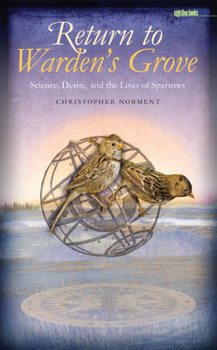Return to Warden's Grove: Science, Desire, and the Lives of Sparrows
Based on three seasons of field research in the Canadian Arctic, Christopher Norment's exquisitely crafted meditation on science and nature, wildness and civilization, is marked by bottomless prose, reflection on timeless questions, and keen observations of the world and our place in it. In an era increasingly marked by cutting-edge research at the cellular and molecular level, what is the role for scientists of sympathetic observation? What can patient...
Format:Hardcover
Language:English
ISBN:1587296330
ISBN13:9781587296338
Release Date:March 2007
Publisher:University of Iowa Press
Length:234 Pages
Weight:1.05 lbs.
Dimensions:0.8" x 6.1" x 9.5"
Customer Reviews
3 ratings
tones and ecotones
Published by Thriftbooks.com User , 14 years ago
Norment writes of a life in torment, of living on edges contemplating ecotones common to most but likely perceived by far too few. The book details Norment's Ph.D. research over three summers on the breeding biology of Harris's sparrow around Warden's Grove near the Thelon River in Canada's Northwest Territories, but is essentially a candid introspection. With its meticulous placement of commas, the book is as nearly a grammar as an exorcism of the demons that haunt field biologists. I observed very few typos and only a single intrusion of the popular non-word "hopefully." While I may have learned more of his psyche than is comforting, I longed for Norment to be more forthcoming of his knowledge of the history of the male "who was something more than an 'average' Harris's sparrow" and whose vector intersected Norment's at North Grove "on a beautifully warm day in early June" of his first field season. Norment begins and ends his self-searching chapter, "Killing Things," lamenting his shooting of this bird among the "eighteen (or was it twenty?) individuals of a species that I deeply respected, knew intimately, and loved." Having killed nearly four thousand dragonflies and damselflies during my own Ph.D. field research, I perceive the keen edge of Norment's tone. More than most, field biologists are drawn to those "other nations," to "the far country" whence we strive to view the world and ourselves through the eyes of other species. Via "Return to Warden's Grove," I believe we gain a vantage in this endeavor.
a close observer of the natural world
Published by Thriftbooks.com User , 16 years ago
Norment, an avian biologist, studied the breeding biology of Harris' Sparrow in the Northwest Territories of Canada for several seasons. He lived in a small cabin at the edge of the Thelon River, northeast of Great Slave Lake. The author closely observed the bird and animal life in a harsh,remote but beautiful landscape. His is a sensitive, emotional portrait of the natural world, beautifully written. This is one of the best nature memoirs I have ever read.
A scientist's journey into the wilderness
Published by Thriftbooks.com User , 16 years ago
In 1988, at age 37, with an 18-month-old daughter and a precarious financial outlook, biologist Norment decides to chuck his steady, if unsatisfying teaching job, and pursue his doctorate. He chooses to study Harris's Sparrows, for two good reasons. For one, they breed in a beautiful, isolated patch of the Canadian arctic that Norment remembers with longing from a youthful 3-year stint there. And the second good reason is that because the place is so remote, very little is known about them. His book describes the three summers that he spent in Warden's Grove - from the initial uncertainties, failures and fears of failure to his increasing confidence in himself and affection for his subject. The structure of his book echoes this path, moving from the general and objective to the specific and subjective. The beginning is concerned with setting up the project - repairing the bear-trashed cabin, finding the sparrow's nests, trapping and banding birds, recording the data. Not until the end of the book do we learn of the nightmares he had about horrible accidents befalling his tiny daughter, or how deeply aware he was of the effect his youthful experiences in Warden's Grove had had on his psyche, as if coming back could make him young and carefree again. We learn little about his research assistants (there was a different one each year), but at the end of the book he admits he kept them - even the two who were close friends - at arm's length, never discussing anything personal. As he settles more comfortably into the project, he describes the satisfaction he gets from the work, his pleasure in maps and the beauty of scientific names, the hours of watching undone by the superior patience and attention of a small bird, the plagues of mosquitoes and black flies and the differing personalities of the clouds of delicate, crafty mosquitoes and the hordes of frenzied, voracious black flies. We share his relief when one of the female sparrows escapes a shrike attack and his ambivalence about "collecting" - killing birds (outside his project area of course) for science. Norment gives us a feel for the work and the attention to detail, but he gives us an even stronger feel for the scientist, his place in the scheme of things, his relation with the wilderness. The writing is contemplative, vivid and sometimes dryly humorous, mostly when dealing with bugs: "Mosquitoes hovered at the screen door, persistent in their obsessive interest, their collective hum an ironically gentle susurrus." This is a book for anyone interested in the natural world and especially in one man's journey as he gropes his way through life with determination, doubt and eloquent reflection.





